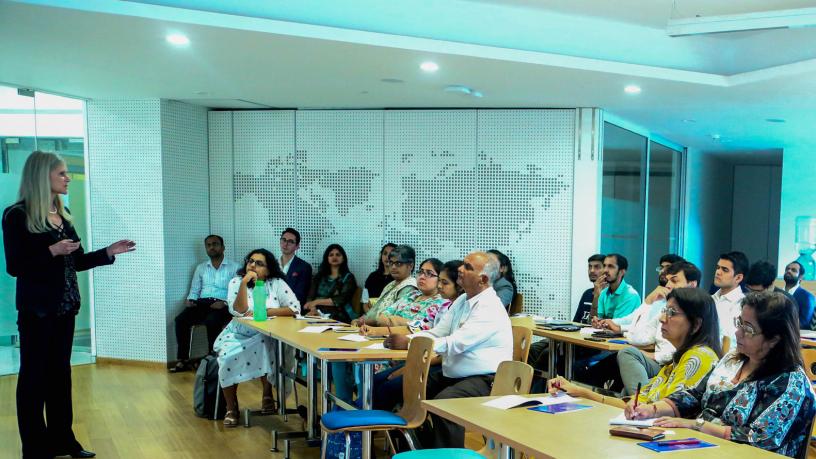Building a Sustainable India
Columbia’s 2018 Design Challenge brings innovation to office spaces
India isn’t just the world’s fastest-growing major economy; it’s also one of the world’s largest construction sites, currently on its way to tripling its supply of commercial and institutional stock since 2010.

Patricia Culligan recently returned from a fact-finding mission to India.
What’s driving much of that development is the need for new office spaces, as the country strains to make room for a vast young workforce expected to hit 700 million by 2030. But along with any building project of that scale come serious environmental questions—prompting experts to ask how the country can best support human productivity while producing the least emissions, waste, and damage to waterways.
Enter the Urban Works Innovation Challenge 2018, in which Columbia student innovators and entrepreneurs are invited to help create new approaches to dynamic, sustainable work spaces. Competitors from across the university will collaborate on ideas, prototypes, and startups drawing on green technologies, decentralized infrastructure, ergonomics and more, seeking to address a host of issues ranging from clean energy to waste reclamation to stormwater management.
“We’re being very inclusive in how we think about workspaces,” said Patricia J. Culligan, Robert A. W. and Christine S. Carlton Professor of Civil Engineering, who is heading up Columbia’s New York end of the challenge. “It could be an office, a loft, a factory floor, or even a person setting up a table by the side of the road—how can we provide the best work experience possible while making spaces more sustainable?”
Tailoring solutions for India’s particular needs will be key. Most innovations for 21st-century workspaces are designed for the United States and Europe, far removed from the perspectives of rapidly developing nations. Accordingly, a few top teams will travel to India next year to explore next steps and meet with Indian colleagues competing via the Columbia Global Center in Mumbai.
“A big part of this challenge is accounting for cultural contexts and considering how people will actually use spaces,” said Culligan, who recently returned from a fact-finding mission to India. “Can we really just import western-style spaces into other cultures and have people feel comfortable, productive, and inspired?”
The competition begins October 2 with an orientation featuring Culligan and fellow faculty advisers Ioannis Kymissis, V. Faye McNeill, and Vijay Modi of electrical, chemical, and mechanical engineering, respectively, as well as leadership from Columbia’s Global Centers. In November, teams will share ideas for feedback before facing off at final presentations in December. Up to three winning groups will fly to Mumbai in January for 10 days of workshops, site visits, client discovery, and sessions with their Indian counterparts. Starting in May, the top New York team will spend two weeks at the CoWrks Foundry in Bangalore working to make a viable business out of their prototype.
A big part of this challenge is accounting for cultural contexts and considering how people will actually use spaces.
The Urban Works challenge is the result of a new partnership between Columbia Engineering and the Columbia Global Center in Mumbai along with CoWrks, a local acceleration program for early stage businesses in fields including urban tech and social entrepreneurships, and the RMZ Foundation, a major philanthropic organization aiming to create a more sustainable and equitable India through inclusive growth.
The initiative marks the latest in a series of design challenges spearheaded by the University. Earlier iterations have yielded promising ideas for confronting Ebola and urban pollution; this challenge kicks off a projected three years of collaboration bringing together engineering, planning, public health, business and policy experts, among others, to transform India’s workspaces.
“Columbia Engineering is very excited to be a partner in this design competition,” Culligan said. “The workspaces of tomorrow will shape our future and it’s fitting that our students will be the innovators in this area.”
